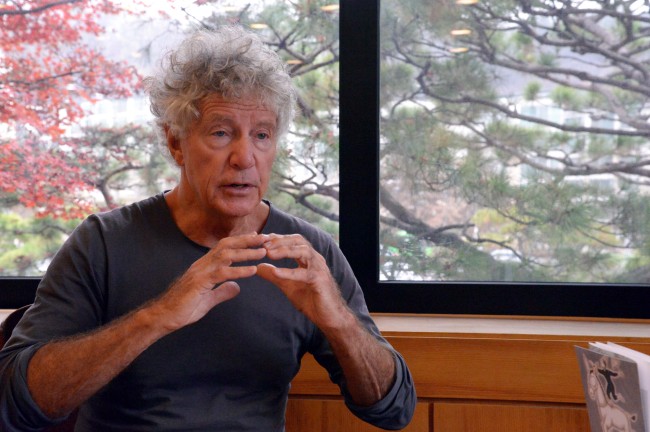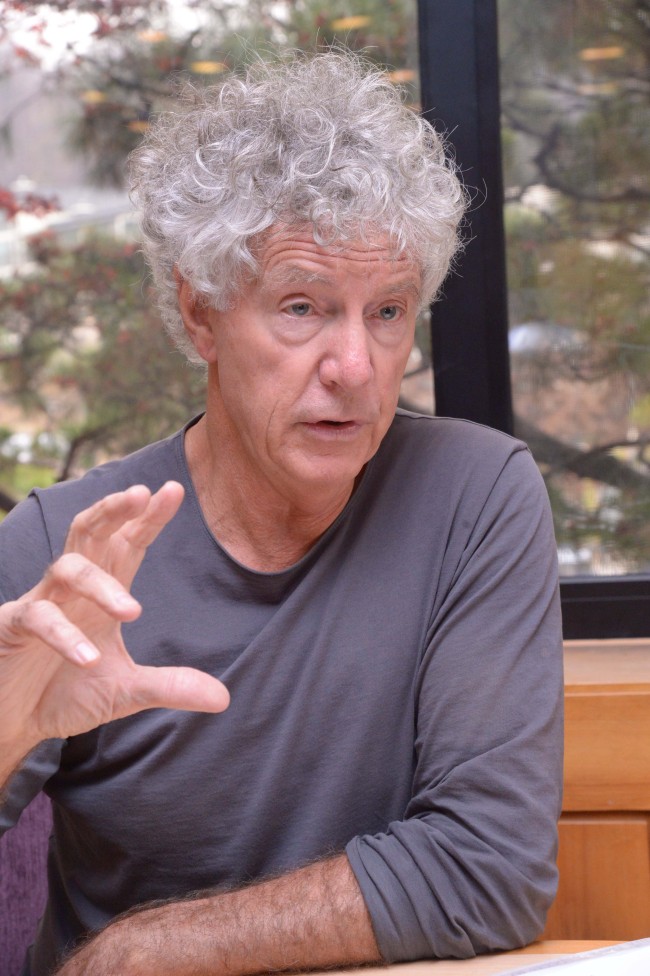The South Korean government’s move to publish state-authored textbooks mimics tactics used by countries that attempt to control public memory of the past following their transition from dictatorships to democracies, a leading political theorist said.
John Keane, political science professor at the University of Sydney who authored “The Life and Death of Democracy,” stressed that democratic societies must allow people with different viewpoints to debate over different interpretations of history.
“I have an idea that democracy among living people requires democracy among the dead. In other words, it requires an openness to the past, a sense of puzzlement about the past, a sense that the past is difficult to understand and that the past has many different voices and viewpoints,” Keane said in an interview The Korea Herald.
“I find it very strange that the democracy could introduce laws to have one view of history taught in schools that happens to be the government’s. This is against the principle of monitory democracy,” he said, referring to his famous political theory in analyzing the emerging trend in contemporary democracy.
 |
| John Keane, a politics professor at the University of Sydney and the Wissenschaftszentrum Berlin. Chung Hee-cho/ The Korea Herald. |
Keane was in Seoul to attend a forum discussing the future of Korean politics on Nov. 22, upon the invitation of Policy Network Tomorrow Story, a policy research institute that New Politics Alliance for Democracy Rep. Ahn Cheol-soo founded in 2013.
Keane described “monitory democracy” as a “post-electoral” and “extra-parliamentary” mechanism that is beyond the principle of modern democracy. He noted that the system will enforce public scrutiny of power being exercised “from bedroom to the boardroom and even in cross-border settings.” Keane asserts that in contrast to the earlier eras of democracy in territorial state form, many new mechanisms are mixed and combined with new ways of publicly monitoring and controlling the exercise of power.
Keane noted that this power-scrutinizing system has implications for Korea’s political landscape, where voters doubt whether the two mainstream parties — split by ideological and regional differences — could represent their diverse interests.
According to the 2015 survey from Korea Institute for Health and Social Affairs, only 5 percent of the respondents said they joined political parties. And the respondents picked the National Assembly, Korea’s legislative body, as the least reliable government agency.
Criticizing Korea’s political parties for enjoying a “duopoly” – the ruling Saenuri Party and the main opposition NPAD claim 285 seats out of the 295 — the professor urged the parties to “democratize” themselves and build a “monitoring” body outside routine political cycle.
“Democracy is the public ownership of the means of the governing, not the privatization of the means of the government. Built outside election cycles and political parties, new monitory bodies can give citizens and their chosen representatives a much stronger sense of ownership of the whole politics,” Keane said.
“(Parties should) open up the political parties through primaries, internal democracy, rotation of leaders through transformation of funding, (and) the grassroots of the citizens, using state-of-the-art algorithms and digital media,” he said.
Keane highlighted that those “power-monitoring” networks are the ones who would bring substantial political changes in contemporary democracy, not the orthodox mechanisms of party-based representation such as political parties, elections, legislatures and the government.
 |
| Professor Keane. |
The professor also took issue with the government’s crackdown on those who protested on Nov. 14 against labor reforms and state textbooks. Keane said that such dissatisfaction with the government and street protests are “normal” phenomenon in contemporary democracies.
President Park Geun-hye labeled the demonstration as an “illegal protest” inspired by behind-the-scenes violence groups. The government on Saturday banned the protesters from staging another rally on Dec. 5, citing public safety concerns.
“Dissatisfaction is a twin of the democracy. It unleashes dissatisfaction with the way things are. Democracy becomes rough and tumbles. There are many leaks there are many scandals. This is normal in the age of democracy and we should get used to this,” Keane said.
“Changing things through laws such as through elections and parties are vital. But I think that democracy changes happened in local context of everyday life such as through the changing behavior of citizens,” he said. “All of (great transformations) never began in parties and parliament and government. It began outside through the monitory associations and bodies.”
While protests have contributed to Korea’s democracy, he cautioned that festival-like rallies have their limits and that the movement could be dominated by mob rule and morph into populism that takes advantage of the people’s frustration over established politics.
“(Festival-like protests) are not durable. It can’t last for long. It comes and goes. And what is instead needed is permanent monitory mechanism that enables watching of powers … the prevention of arbitrary powers,” said Keane.
Referring to Korean voters’ deep frustration with politics, particularly among those in their 20s who had the lowest turnout rate in the latest 2012 presidential election, Keane urged the political parties to nurture leaders who better engage with the politically frustrated voters.
“The context in which (young voters’) dissatisfaction happens is the sense that the elderly have all the cards, that they run the society and their influences disproportionate. … Young people join the parties (where) these politicians speak to them and speak their language,” said Keane.
“I am hoping young generations of politicians may be represented by figures like Canadian Prime Minister Justin Trudeau or young Obama, who understand this dynamic … Unfortunately, there are too many politicians and too many parties that are out of steps. I have suspicions as an outsider, Korea is the case. There needs to be the shake-up of the system,” Keane said.
Born in southern Australia, Keane is a cofounder and director of the Sydney Democracy Network, a nonprofit organization that deals with multidisciplinary policy studies research projects. The Times ranked him as one of Britain’s leading political thinkers and writers whose work has “worldwide importance.”
Among Keane’s published books are “The Media and Democracy,” the award-winning biography “Tom Paine: A Political Life,” “Democracy and Media Decadence,” “The Future of Representative Democracy,” “Violence and Democracy” and “Global Civil Society.”
By Yeo Jun-suk (jasonyeo@heraldcorp.com)

